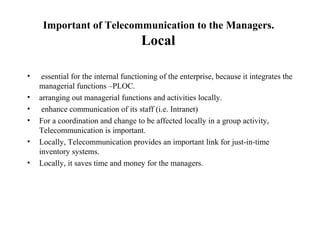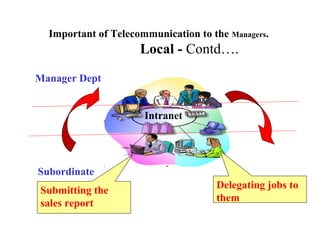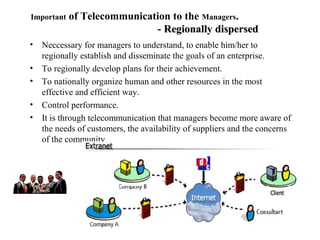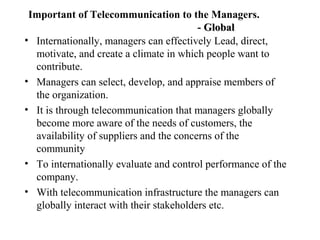Why Manager Should Understand Telecommunication
- 1. Why Manager Should Understand Telecommunication …? By: Anthony-Claret Onwutalobi
- 2. Overview 1. Introduction 2. Who is manager ? 3. What is Telecommunication? 4. Important of Telecommunication to the Managers. a. Local b. Regionally dispersed c. Global operations. 5. Conclusion 6. Acknowledgement / References 7. Questions
- 3. Introduction • We live in an era that is often referred to as the INFORMATION AGE. With the advent of Computer and telecommunication technology, this era has rapidly transformed the manager into an analyzer, manipulator, gatherer, and distributor of Information. However, this Information comes in a variety of forms, all representing some meaningful arrangement of the human thought process.
- 4. Who is manager Definition • allocates human and material resources and directs the operations of a department or an entire organization. • achieve an organization’s or department’s goals for the most part by arranging for others to do things • involves planning, organizing, leading, and controlling the people working in an organization to achieve the organization’s goals. Manager Today ……. • is much better than before, in use of sophisticated telecommunication infrastructure and services as we are step into information age. • data transferring should be fast and efficient with the help of telecommunication technology
- 5. What is Telecommunication? • Is a communication at a distance (tele is Greek for far) via a collection of information sharing – system like telephony, telegraphy and television etc all tied together. • These include the public switched telephone network(PSTN). Radio and television networks and the worldwide computer networks. Services provide to the manager meeting via teleconferencing email notice to their subordinates communicate with customer via/fax/telephone implement marketing strategy through Internet
- 6. Important of Telecommunication to the Managers. Local • essential for the internal functioning of the enterprise, because it integrates the managerial functions –PLOC. • arranging out managerial functions and activities locally. • enhance communication of its staff (i.e. Intranet) • For a coordination and change to be affected locally in a group activity, Telecommunication is important. • Locally, Telecommunication provides an important link for just-in-time inventory systems. • Locally, it saves time and money for the managers.
- 7. Important of Telecommunication to the Managers. Local - Contd…. Manager Dept Subordinate Intranet Submitting the sales report Delegating jobs to them
- 8. Important of Telecommunication to the Managers. - RReeggiioonnaallllyy ddiissppeerrsseedd • Neccessary for managers to understand, to enable him/her to regionally establish and disseminate the goals of an enterprise. • To regionally develop plans for their achievement. • To nationally organize human and other resources in the most effective and efficient way. • Control performance. • It is through telecommunication that managers become more aware of the needs of customers, the availability of suppliers and the concerns of the community.
- 9. Important of Telecommunication to the Managers. - GGlloobbaall • Internationally, managers can effectively Lead, direct, motivate, and create a climate in which people want to contribute. • Managers can select, develop, and appraise members of the organization. • It is through telecommunication that managers globally become more aware of the needs of customers, the availability of suppliers and the concerns of the community • To internationally evaluate and control performance of the company. • With telecommunication infrastructure the managers can globally interact with their stakeholders etc.
- 10. Conclusion • Clearly, there is no universally applicable Telecommunication system for the managers locally, regionally or globally but it should be tailored to the managers needs of an organization. • Understanding telecommunication will enable the managers to transfer information as well, linked together with suppliers, customers, the community and people and other stakeholders worldwide. All is to achieve a common purpose.
Editor's Notes
- #7: \










